As its name might suggest, social media monitoring is all about monitoring content and engagement across social media platforms. It might seem self-explanatory, but what does it look like in practice? Essentially, it comes down to tracking and analysing data and engaging and interacting with followers. There are a variety of specialised tools and techniques on the market that can help brands and individuals to gather data on ‘mentions’ of specific keywords, hashtags, or accounts to then provide insights into key data such as reach and interaction with their page. Not only does monitoring offer these insights, but it helps provide understanding on public perception, spotting trends, as well as measuring the impact of social media activities and strategies.
As already mentioned, there are a variety of benefits of social media monitoring, including, but not limited to, the following:
- Reputation management: By monitoring social media, individuals/ businesses can quickly address negative comments or misinformation to help maintain a positive public image.
- Customer insights: Accounts can gain valuable insights into customer preferences and behaviours, which in turn can inform their marketing strategies to be more targeted.
- Competitive analysis: Monitoring competitors’ social media activities helps brands/individuals to stay informed about market trends and competitor strategies.
- Crisis management: Early detection of potential crises allows for a swift response to prevent it taking on momentum.
- Engagement opportunities: Engaging with customers and followers in real-time enhances relationships and builds a loyal community.
- Content improvement: Feedback gathered from social media monitoring can help to inform content strategies – making them more effective and relevant.
- Personal branding: For individuals, monitoring social media can help manage personal reputation and connect with influential networks.
Key Features to Look for in Social Media Monitoring Tools
As already discussed, there are a host of tools on the market that support and enhance social media monitoring. With so many to choose from, it can feel like an overwhelming decision to make. Here are some key features to consider when selecting monitoring tools:
- Real-time Monitoring: This feature allows you to track social media conversations as they happen. It allows you to swiftly respond to mentions, comments, or emerging trends – helping you to maintain a proactive online presence and strong audience engagement.
- Sentiment Analysis: This helps you understand the tone and emotion behind social media mentions to determine whether posts are positive, negative, or neutral. By doing so, you can gauge public perception and adjust your strategies accordingly.
- Competitor Analysis: Monitoring your competitors’ social media activities provides valuable insights – such as identifying industry trends and strong strategies, as well as discovering potential opportunities or threats.
- Reporting and Analytics: Reporting tools are invaluable for measuring the success of your social media strategies. Detailed analytics provide essential data on engagement, reach, and other key metrics – helping you to make informed decisions and targeted strategies moving forward.
Top Social Media Monitoring Tools
Whilst there are many tools to choose from, we’ve rounded-up what we consider to be the top social media monitoring tools on the market today. Generally speaking, we think that Hootsuite is great for overall social media management, whilst Brandwatch excels in in-depth analytics. If you’re looking for usability and reporting, then Sprout Social is likely the choice for you. If your focus is on real-time monitoring, then Mention would be the ideal fit, whilst Talkwalker offers advanced visual and social listening capabilities. Whatever you end up going with, your choice should depend on your specific requirements, budget, and the level of detail you need from the monitoring tool.
Here’s a breakdown of our top 5’s key features, pros and cons…
1. HOOTESUITE
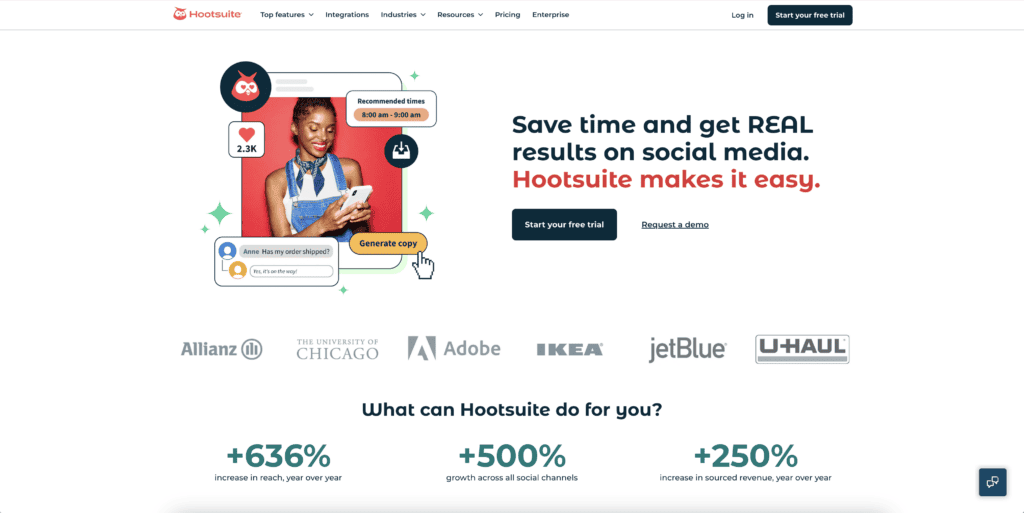
Features:
- Dashboard for managing multiple social media accounts.
- Analytics for tracking performance.
- Scheduled posts.
- Monitoring of social media conversations.
- Team collaboration features.
Pros:
- User-friendly interface.
- Comprehensive analytics.
- Supports multiple social media platforms.
- Excellent customer support.
Cons:
- The free plan has limited features.
- Can be expensive for small businesses.
- Steeper learning curve for advanced features.
2. BRANDWATCH
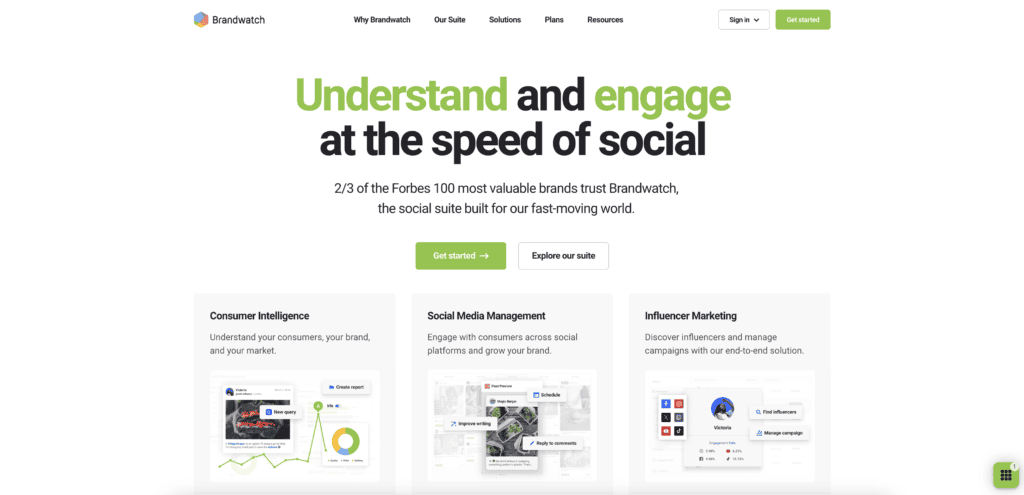
Features:
- In-depth social listening and analytics.
- Competitive analysis.
- Influencer tracking.
- Customisable dashboards.
- API integration.
Pros:
- High level of data accuracy.
- Advanced sentiment analysis.
- Extensive historical data.
- Customisable reporting.
Cons:
- Expensive compared to other tools.
- Can be complex for new users.
- Limited integration with smaller social networks.
3. SPROUT SOCIAL
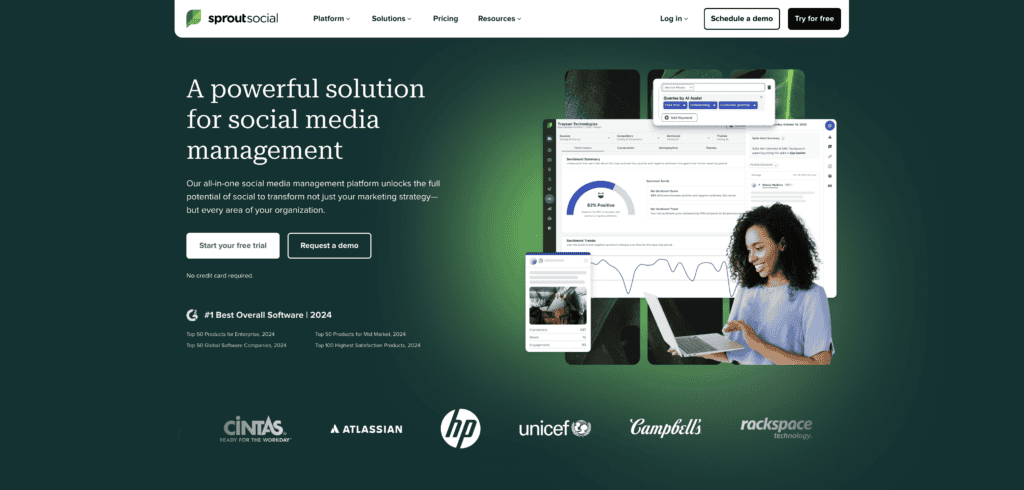
Features:
- Social media scheduling and publishing.
- Comprehensive reporting and analytics.
- Social listening and monitoring.
- Customer relationship management (CRM) tools.
- Task assignment for team collaboration.
Pros:
- Intuitive and easy-to-use interface.
- Strong reporting capabilities.
- Excellent customer service.
- Integrates with a variety of platforms.
Cons:
- Higher pricing tier.
- Limited customisation in some reports.
- Can be overkill for very small businesses.
4. MENTION
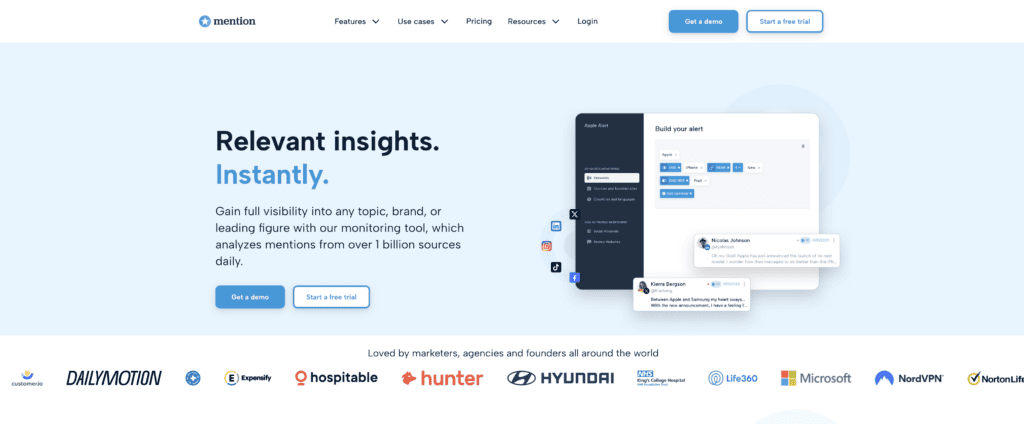
Features:
- Real-time social media monitoring.
- Automated alerts.
- Competitor tracking.
- Sentiment analysis.
- API access for custom integration.
Pros:
- Real-time updates and alerts.
- Easy to set up and use.
- Good value for money.
- Supports multiple languages.
Cons:
- Limited historical data in lower-tier plans.
- Reporting features could be improved.
- Integration options are somewhat limited.
5. TALKWALKER
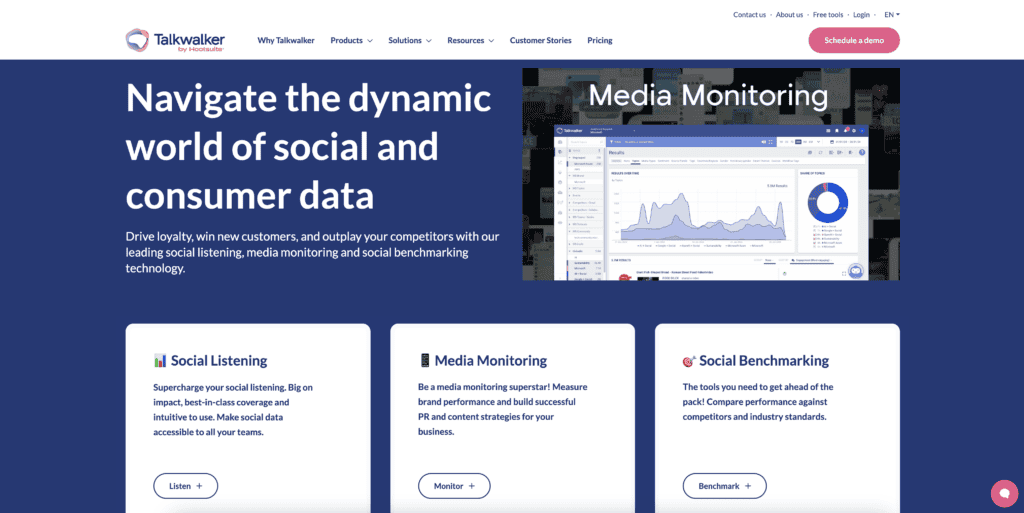
Features:
- Social listening and analytics.
- Visual analytics and image recognition.
- Competitor benchmarking.
- Customisable dashboards.
- Crisis management alerts.
Pros:
- Excellent visual analytics.
- Robust data analytics and insights.
- Wide range of data sources.
- Flexible and customisable.
Cons:
- Expensive for small businesses.
- Requires training to utilise fully.
- Interface can be overwhelming initially.
How to Choose the Right Tool for Your Needs
When it comes to choosing the right tool for you and your needs, there are some key factors to consider to help you make the right choice. As with any – large or small – decision, your budget should come pretty high up on the list of considerations. You need to determine how much you’re willing to spend and explore the tools that offer the best features within that range.
Another element to consider is specific use cases – first, identify the tasks you need the tool for and then find a tool that specifically meets those requirements.
A practical consideration – that is easy to overlook in the midst of the excitement of the hunt – is whether the tool will actually integrate with your systems and software. If it won’t seamlessly connect with your existing tools then it’s just not going to work.
It might feel like a minefield navigating the range of tools out there, but through research, reading reviews, and engaging in available trials, you’ll have all the necessary insights to make an informed decision for what’s right for you.
When all of these elements are taken into consideration, you’ll be fully equipped to find a tool that not only fits your budget but also optimises performance and integrates within your existing software and workflow.
Final Thoughts
When it comes to selecting a social media monitoring tool, the choice is extremely personal. With a variety of tools available on the market, it can feel challenging to narrow it down to find the right one for you. It’s important to identify and be really clear on what your specific needs are, before searching for tools that fit these needs and fall within your budget. A little reading of reviews and taking advantage of practice trials will go a long way. Take the time to do your research and sample what’s out there, as it’s worth it! The process of tracking and analysing data is not only beneficial for reputation management, customer insights and competitive analysis, but for engagement opportunities and content improvement too. Social media monitoring is one of, if not the most, efficient and effective way to use data to optimise your engagement and reach – and get real results!
